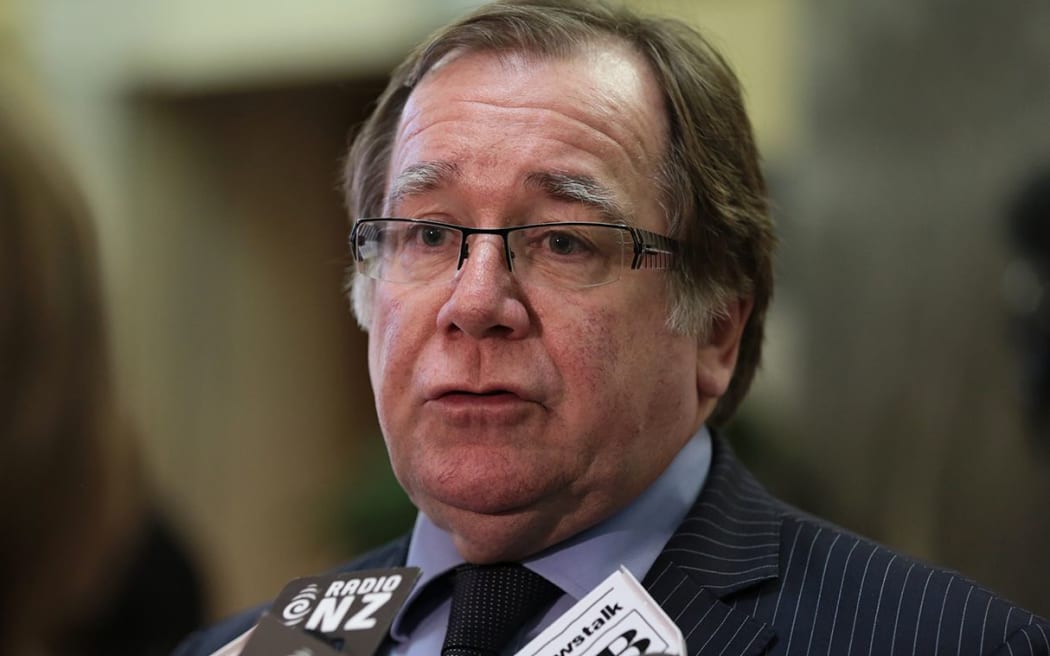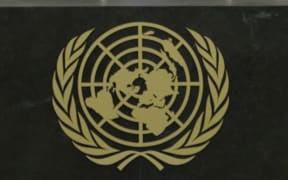New Zealand's strong reputation is behind its success in winning a seat on the United Nations Security Council, UN representative Jim McLay says.

New Zealand's United Nations Permanent Representative Jim McLay reacts after New Zealand was elected as a non-permanent member of the Security Council. Photo: AFP
New Zealand this morning won a seat on the Security Council, in a ballot conducted at the General Assembly in New York.
New Zealand gained 145 votes of the 193 cast by UN member states to secure the non-permanent seat, which is one of five.
The other states to be elected were Angola, Malaysia, Venezuela and Spain.
Mr McLay is New Zealand's ambassador to the UN General Assembly and will take up the seat in the new year.
He told Nine to Noon New Zealand was well-respected internationally and had a reputation for not being associated with any political alliances.
"That independence is widely valued here at the UN," he said.
"People were saying to us ... 'we want you on the council because you don't have any baggage, you don't have border disputes, you don't have issues of other countries, we want you on the council because that gives you independence and objectivity."
The Security Council seat would allow New Zealand to be part of real decision making on key international peace and security issues, Mr McLay said.
Foreign Minister Murray McCully was at the assembly to hear the results of the vote, at the end of a campaign launched by New Zealand in 2004.
He told Morning Report New Zealand would be an active member of the council.
"We obviously have some strong views about the trouble spots in the world and, particularly, the inability of the UN Security Council to find a way of dealing with most of them," he said.
"I've been fairly critical, and so has the Prime Minister, in that respect.
"So if you're going to criticise you have to put yourself forward and say 'we'll help fix this'."

Murray McCully. Photo: RNZ / Diego Opatowski
Gaining a seat on the council would also help serve New Zealand's interests, Mr McCully said.
"Serving on the council has you sitting at the big table with the big players.
"It does give you a chance to advance your interest, to talk to countries about relationships in the trade and economic area and so on."
However, it would not influence its decision on its involvement in the fight against the Islamic State, Mr McCully said.
"The Prime Minister has made it clear that the decision-making process will go through as a country about how we should deal with the risks to us as a result of foreign fighters," he said.
"What the seat on the Security Council will do is give us a seat at the table where these matters should be able to be dealt with."
Prime Minister John Key said New Zealand's success was a victory for the small states which made up more than half the UN's membership.
The campaign against Spain and Turkey had been tough but the win proved small countries had a role to play at the UN, and New Zealand was determined to represent the perspective of small states.
Turkey's Ambassador said she was disappointed her country lost a seat on the council to New Zealand.
Damla-Yesim Say said she was pleased New Zealand gained a seat, but sad for her country.
"Almost all the issues on the agenda of the Security Council is, or has been happening around Turkey.
"We really believe that we could have contributed a lot with our on-site experience."
She said New Zealand's long 10 year campaign for the Security council seat was probably why it was successful.
Challenge for NZ
New Zealand would face a challenging time as it was joining the council at a time of global volatility, Mr Key said.
"It'll be quite a challenging time to actually be on the Security Council. Some very, very big issues as we see in the middle east at the moment, and it'll be a demanding time for New Zealand.
"But I think the brand spoke for itself. We ran very much a campaign that was traditional. We didn't throw a lot of money at it."
The money which was thrown at it included goodie bags containing lip balm and stationary and before voting New Zealand gave member countries New Zealand-made cheese, crackers and water.
Rwanda support remembered
Labour Party foreign affairs spokesperson David Shearer agreed with Mr McLay that New Zealand's independent stance and commitment to other small countries helped swing the vote in its favour.
New Zealand stood up for Rwanda the last time it was on the Security Council, and that was remembered, Mr Shearer said.
"We've got a nuclear free policy where we stood up and took and independent stance on that.
"All of those types of issues build into the way we're perceived overseas and internationally, and I think that's helped our causes," he said.
Ministry restructuring 'will inhibit ability'
The last time New Zealand held a seat on one of the world's most powerful bodies was in 1994 and the man who held the role, Terrance O'Brien, said our Ministry of Foreign Affairs and Trade (MFAT) could struggle to provide the necessary back-up to the council representative.
Cut backs at MFAT in 2012 could mean the representative would not get the necessary advice to be an active player, Mr O'Brien, who was president of the Security Council in the 1990s, said.
"The reforms that have been undertaken have undoubtedly diluted the level of experience and knowledge inside MFAT and it's going to be a real test for them, I think, to supply the sort of backup that the UN Security Council delegation will need."
Former president of the United Nations Association of New Zealand Michael Powles said the win was a tremendous achievement and will give New Zealand more leverage in trade negotiations.
But he also said restructuring since 2012 at MFAT, which triggered a revolt by senior diplomats, will make it harder to be effective.
"The restructuring that's happened within the Ministry of Foreign Affairs and Trade over the last two or three years has diminished significantly its overall capacity in international relations and that can only have an impact on our effectiveness at the UN."
Mr Powles said the workload for members of the Security Council was immense and the team will need people of knowledge, experience and good judgement.
Opposition parties said New Zealand must live up to its reputation for independence with its new seat.
The Labour and Green parties say New Zealand must also ensure it keeps its independence and not worry about offending trading partners.
International aid agency Oxfam was calling the Government to use its new position to stand up for civilians caught up in war.
Spokesman Luke Roughton said New Zealand was elected to the council with the support of many small states, who hoped it would give them a voice at the UN's most powerful forum.
Mr Roughton said Security Council membership was demanding for any country, especially a little one like New Zealand, and he hoped the delegation would draw on the expertise of agencies like Oxfam.



